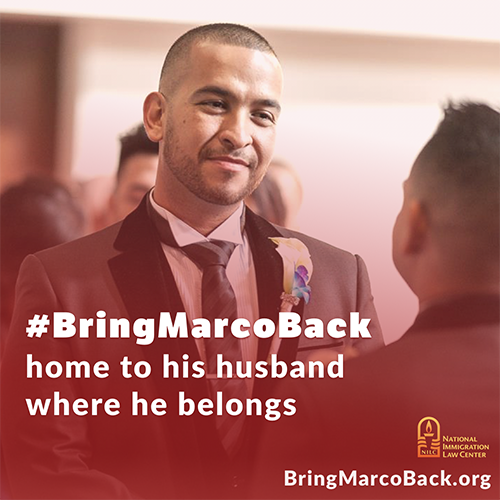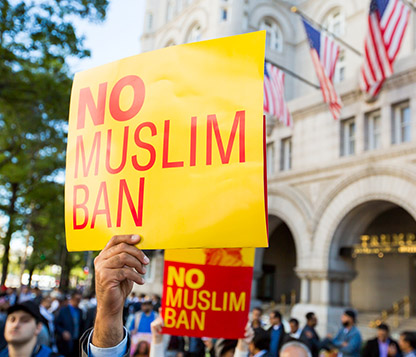Government’s Supreme Court Argument Tries to Divorce from Trump’s Own Words and Record His Ban on Travel from Muslim-majority Countries
THE TORCH: CONTENTSBy Esther Sung, NILC staff attorney
APRIL 25, 2018
Today, after two executive orders, one presidential proclamation, and fifteen months of litigation, the U.S. Supreme Court finally heard oral arguments on the legality of President Trump’s Muslim ban.
The current version of the ban blocks from entering the U.S. most travelers and immigrants from six Muslim-majority countries — Chad, Iran, Libya, Somalia, Syria, and Yemen — although Chad was recently removed from this list after improving its “identity-management and information sharing practices.” The ban also blocks travelers and immigrants from North Korea and certain Venezuelan government officials and their families.
Despite having itself been blocked by two U.S. district courts, the ban has been in place since December 4, 2017, when the Supreme Court allowed it to go into effect while it was being litigated. The U.S. State Department recently reported that in the first month of the ban, only two out of 8,406 visa applicants directly impacted by the ban were granted waivers allowing them to enter the U.S.
Indeed, of particular concern to Justices Breyer and Sotomayor in today’s argument was the possibility that the ban’s waiver provisions are merely “window dressing.” Justice Breyer pointed out that a significant number of people seeking visas probably fit within the exemplars expressly identified in the presidential proclamation as potentially eligible for an exemption from the ban. Although both justices pressed the government to explain what mechanisms are in place to ensure that the ban’s promise that waivers are available “is, in fact, a real waiver process,” the government was unable to provide substantive information about the availability of waivers. The government was only able to represent that approximately 400 individuals have received waivers — but, as Justice Breyer pointed out, 400 is paltry in comparison to the 150 million people the proclamation bans from entering the U.S.
Instead, the government focused on defending the ban before the Court as the product of a “multi-agency worldwide review that applied neutral criteria.” Throughout its argument, the government took pains to distance the ban not only from its predecessor executive orders, but also from President Trump and the many anti-Muslim statements he has made throughout his candidacy and presidency.
Neal Katyal, representing the ban’s challengers, argued that if the Court adopts the expansive view of executive power advanced by the government, the Court will be giving the president the power to line-item veto any provision of the country’s immigration laws that he wants to override. He argued that the ban countermands Congress’s finely reticulated immigration scheme, violates the Immigration and Nationality Act’s prohibition against nationality-based discrimination in the issuance of immigrant visas, and denigrates Islam in violation of the First Amendment.
It was clear that the government’s strategy depended on stripping the ban of its history and context so that the government could divorce the ban from President Trump’s many anti-Muslim statements and thereby argue that the ban is a permissible exercise of executive power. But by doing so, the government could only duck and weave around the overwhelming evidence of the president’s anti-Muslim animus, rather than confronting it head-on.
Among those present for today’s argument were Senator Mazie Hirono of Hawaii; Karen Korematsu, the daughter of Fred Korematsu, the named plaintiff in Korematsu v. United States, which upheld the imprisonment of Japanese-Americans in World War II; and Lin-Manuel Miranda, Pulitzer Prize–winning author of the musical “Hamilton.” Friend-of-the-court briefs calling on the court to strike down the ban had been filed by retired government officials and military officers; various states and major cities and counties; Amazon, Facebook, and over a hundred other companies; Catholic bishops and numerous other clergy of several different religions; universities and other institutions of higher learning; and Karen Korematsu and other children of Japanese-Americans who were held in internment camps during World War II.
A recording of today’s argument is available here; a transcript of it is available here.







